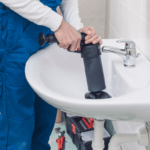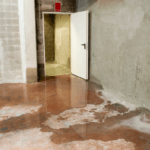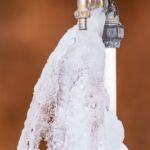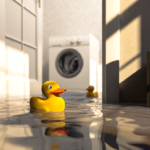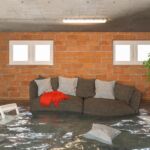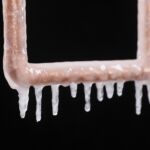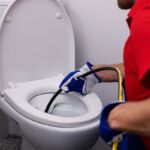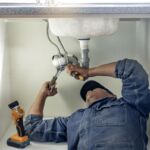
Nov 9, 2023 | Leaking Pipe, Plumbing services, Sump Pump
Many households deal with the common and frequently disastrous issue of basement flooding. Whether brought on by persistent rain, melting snow, broken plumbing, or inadequate drainage, basement flooding may have devastating financial and emotional effects.
However, you may reduce the chance of basement flooding and safeguard your property by taking the appropriate preventive steps and taking a proactive attitude. This article looks at a detailed manual on how to guard against basement flooding and prevent water damage to your property.
Tips To Prevent Your Basement Flooding
The following tips will help you have a great time in preventing basement flooding and water damage to your house, read further for detailed methods:
Maintain Gutters and Downspouts
Make sure your gutters and downspouts are in good functioning order as one of the major measures to prevent basement flooding. Water overflow caused by clogged or damaged gutters can accumulate near the home’s foundation and raise the possibility of basement flooding.
Examine and clean gutters regularly, clearing them of leaves, objects, and anything else that can restrict the flow of water. To stop water from leaking into the basement, extend downspouts away from the foundation and send water at least five feet away from your property.
Proper Landscaping & Grading
Your landscape’s grade is very important for preventing basement flooding. To keep water away from the basement walls, the land around your house should ideally slope away from the foundation.
Water can build up around the foundation due to poor grading, which can cause seepage into the basement. If necessary, have the grade evaluated and adjusted by a qualified landscaper or contractor to ensure appropriate drainage away from your property.
Install a Sump Pump System
A sump pump is a crucial piece of equipment that keeps your basement dry by draining extra water that builds up around the foundation. The sump pump is often situated in a pit where water is collected and activates automatically when the water level exceeds a specified level.
Check your sump pump frequently to make sure it is functioning properly, and think about buying a battery backup system to ensure continued operation even during power outages.
Waterproof Your Basement
A proactive strategy to stop water from entering in the first place is to apply waterproofing techniques to your basement. To build a barrier against moisture on basement walls and flooring, think about utilizing waterproofing coatings or sealants.
Additionally, look for any foundation gaps or cracks in your basement and properly seal them. This will shield your home from potential structural damage brought on by water seepage and avoid basement flooding.
Install Window Well Covers
When it rains or snows a lot, basement windows might be access places for water. Window well covers can be installed to create a barrier that stops water from collecting around the windows and leaking into the basement. Window well coverings also ensure improved ventilation and natural light for the basement by keeping debris, leaves, and animals out.
Check and Maintain Plumbing Systems
Unexpected basement flooding can be caused by faulty plumbing. Check the pipes, faucets, and drains in your home’s plumbing system regularly for leaks, obstructions, and wear.
Pay attention to the water pressure and keep an ear out for any strange noises that can point to a potential issue. To avoid water damage to your basement and other areas of your house, fix any problems right away.
Consider French Drains
French drains are a reliable drainage system created to divert water away from the foundation of your house. These drains are made out of underground, gravel- or rock-encircled, soil-covered perforated pipes.
When the foundation becomes clogged with water, it seeps into the perforated pipes and is diverted away from the basement. Installing French drains can help keep your home dry during heavy rains and drastically lower the risk of basement flooding.
Invest in a Backup Power Generator
Power outages during powerful storms are common, and if your sump pump depends only on the electrical grid, it could cause it to stop working.
Purchasing a backup generator guarantees that crucial appliances, such as the sump pump, keep working even during power outages, preventing basement flooding continuously.
Install Basement Flood Alarms
Specialized tools called basement flood alarms can measure the water levels in your basement. When water starts to leak into the basement, these alarms serve as an early warning system and let you know.
Installing flood alarms enables you to respond quickly to the problem before it develops into a major flooding incident. You may receive real-time notifications no matter where you are by connecting some high-tech flood alarms to your smartphone.
Elevate Electrical Outlets and Appliances
The risk of basement flooding to basement-located electrical outlets and appliances is significant. Elevate appliances like water heaters, furnaces, washers, and dryers above any potential water level, including electrical outlets, circuit breakers, and other appliances.
Through this precaution, flooding-related electrical risks and harm to important household appliances can be reduced.
Create a Green Roof or Rain Garden
An eco-friendly and visually beautiful solution to stop basement flooding is a green roof or rain garden. Growing plants on your roof, known as a “green roof,” absorb and hold onto rainwater, thus lowering the overall runoff that may end up in your basement.
In a similar vein, rain gardens are landscaped spaces created especially to catch and absorb rainwater. Rain gardens and green roofs both help manage stormwater and stop basement flooding.
Regularly Inspect and Maintain Foundation Walls
To prevent water from entering your basement, the integrity of your foundation walls is essential. Regularly inspect your property to look for any cracks, leaks, or indications of structural damage.
Repair any problems discovered during these inspections right away to increase the stability of the foundation and stop water intrusion.
Consider Exterior Drain Tile Systems
Buried pipes that are built around your home’s foundation make up exterior drain tile systems. By gathering extra water and rerouting it away from the foundation, these pipes reduce the possibility of basement flooding.
Exterior drain tile systems offer an additional degree of security, even if interior drain tile systems are more frequent, particularly in regions with a lot of rainfall.
Educate Family Members and Practice Preparedness
Inform your family members about the dangers of basement flooding and the appropriate precautions. Everyone should be aware of where the key utility connections are located and how to turn off the main water supply in case of an emergency.
Create a family emergency plan and periodically practice it to ensure that everyone is aware of what to do in case of a flood or other water-related event.
In Conclusion
A proactive strategy and routine maintenance of your home’s drainage and plumbing systems are required to prevent basement flooding. You may considerably lower the likelihood of basement flooding and guard your house against water damage by putting the preventive steps covered in this thorough guide into practice. Keep in mind that the secret to protecting your home’s structural integrity and keeping your basement dry is being proactive and ready.
Are you concerned about the risk of basement flooding in your home or commercial property? Tap Tech is here to help you stay ahead of the game with our expert prevention tips and solutions! Basement flooding can cause extensive damage, disrupt your life, and lead to costly repairs. Don’t wait for disaster to strike – take proactive measures to safeguard your property with the guidance of Tap Tech.
Contact us today to schedule a consultation and secure your property’s safety. Together, let’s create a flood-resistant space that ensures peace of mind and protects your investment for years to come!
Book our services now!
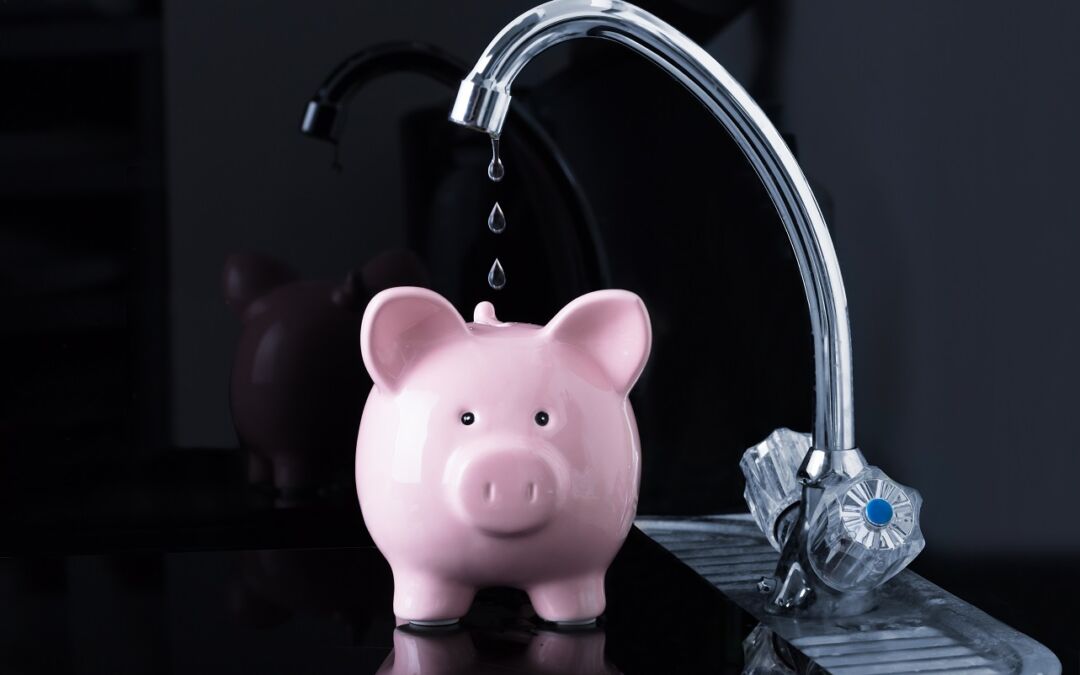
Aug 10, 2023 | Leaking Pipe, Plumbing services
Dealing with a leaking outdoor faucet can be a frustrating experience. However, understanding the potential causes of the leak and how to address them can save you time, money, and water. In this comprehensive guide, we will explore common reasons for outdoor faucet leaks and provide insights into resolving them. While some issues can be fixed by homeowners, certain situations may require professional assistance to ensure a proper repair.
Aging Plumbing
Over time, outdoor plumbing can deteriorate due to various factors such as extreme temperatures, exposure to harsh chemicals, freezing, and corrosion. These conditions can weaken the pipes and joints, leading to leaks in your outdoor faucet. If your outdoor faucet is leaking and the plumbing is old or damaged, replacing it may be necessary.
A professional plumber can assess the condition of the plumbing system and provide expert guidance on the best course of action.
Faulty Washer
A faulty washer is a common cause of outdoor faucet leaks. The washer, a small rubber gasket located inside the spigot, creates an airtight seal between the spout and the base of the faucet. Over time, the washer can deteriorate, become worn, or develop cracks, leading to water leakage when the faucet is turned on.
Addressing this issue promptly by replacing the old washer is essential to prevent further complications. Home improvement stores usually carry replacement washers that can easily be installed by homeowners.
High Water Pressure
Excessive water pressure can contribute to a leaking outdoor faucet. When the water pressure is too high, it puts stress on the faucet and its components, causing leaks to occur. Checking and adjusting the water pressure is a recommended first step.
Locate the pressure regulator, which is typically located near the main water supply valve, and lower the pressure if it exceeds the recommended levels. If you’re unsure about adjusting water pressure or have recently had work done on your property, consult a professional plumber for assistance.
Loose or Damaged Connections
Loose or damaged connections between the outdoor faucet and the water supply line can result in leaks. Inspect the connections for any signs of wear, corrosion, or loose fittings. Tighten loose connections using an adjustable wrench, being careful not to overtighten.
If the connections are damaged or corroded, they may need to be replaced. In such cases, it is recommended to consult a professional plumber who can ensure proper installation and prevent further damage.
To conclude
Leaking outdoor faucets require prompt attention to prevent further damage, water wastage, and potential complications. Understanding the potential causes, such as aging plumbing, faulty washers, high water pressure, or loose connections, allows you to take appropriate action.
While some minor issues can be resolved by homeowners with the necessary skills and tools, it’s advisable to seek professional help for complex repairs or replacement to ensure accurate diagnosis and reliable solutions. Professional plumbers possess the expertise and experience to handle common outdoor plumbing problems efficiently, ensuring the long-term functionality of your outdoor faucet.
For Plumbing Solutions, Tap into Tap Tech!
For over 25 years, Tap Tech has been South Eastern Ontario’s premier plumbing company. No matter what residential or commercial plumbing issue you’re dealing with – from leaky pipes and clogged drains to faulty water heaters and sewer backups – our team of licensed experts has the skills and high-tech tools to diagnose and solve any problem quickly and efficiently.
What sets Tap Tech apart is our commitment to transparent pricing. We provide free estimates and upfront quotes on all plumbing jobs so you never have to worry about surprise fees. From routine maintenance to middle-of-the-night emergencies, our technicians work promptly to get your plumbing back in working order.
Trust Tap Tech for all your emergency plumbing needs!
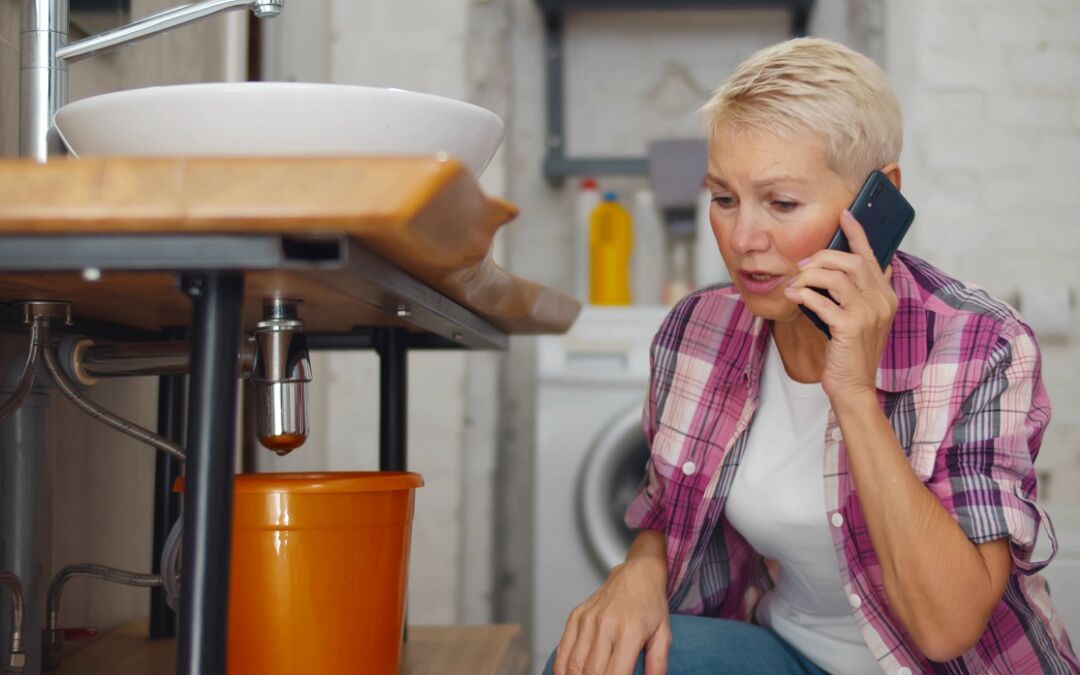
Jul 1, 2023 | Leaking Pipe, Plumbing services
If you discover a leak in your pipes, it is imperative that you act quickly to mitigate further damage to your home and minimize further costs. There are various quick fixes you can employ while waiting for professional emergency plumbers near you to come and address the situation.
Turn Off the Water
As soon as a pipe starts leaking, the first step should be to turn off its source. This may involve simply switching off its valve; however, for optimal results, it’s usually wiser to shut off all your home’s water sources at once in order to minimize damage caused by further leakage and its subsequent worsening. This will prevent further leakage and help to minimize its severity and associated repair costs.
Drain the system
Open the hot and cold at the lowest fixture this is usually the laundry tub in the basement. This will empty the system and release the pressure helping to minimize the damage .
Clean Up the Surrounding Area
Even the strictest maintenance routine may not prevent all leaks from forming in your home. While these leaks may initially appear minor and cause no real harm, if left unattended, they could grow into larger problems quickly if left alone—knowing how to handle these plumbing situations quickly and efficiently is vital to the health of your home’s infrastructure.
Cleanup around a leak is also key to mitigating its impact and getting ready for your trusted emergency plumber to visit. Epoxy putty can help here; just break off a suitable-sized piece, work it between your hands until malleable, and then apply it to the crack or hole. Duct tape can also serve as an emergency repair solution; wrap several layers around the leak to keep it contained until the plumber arrives.
Note: Do not consider this a permanent solution, and call our 24/7 same-day emergency plumbers at 343-305-1172 to quickly rectify the situation.
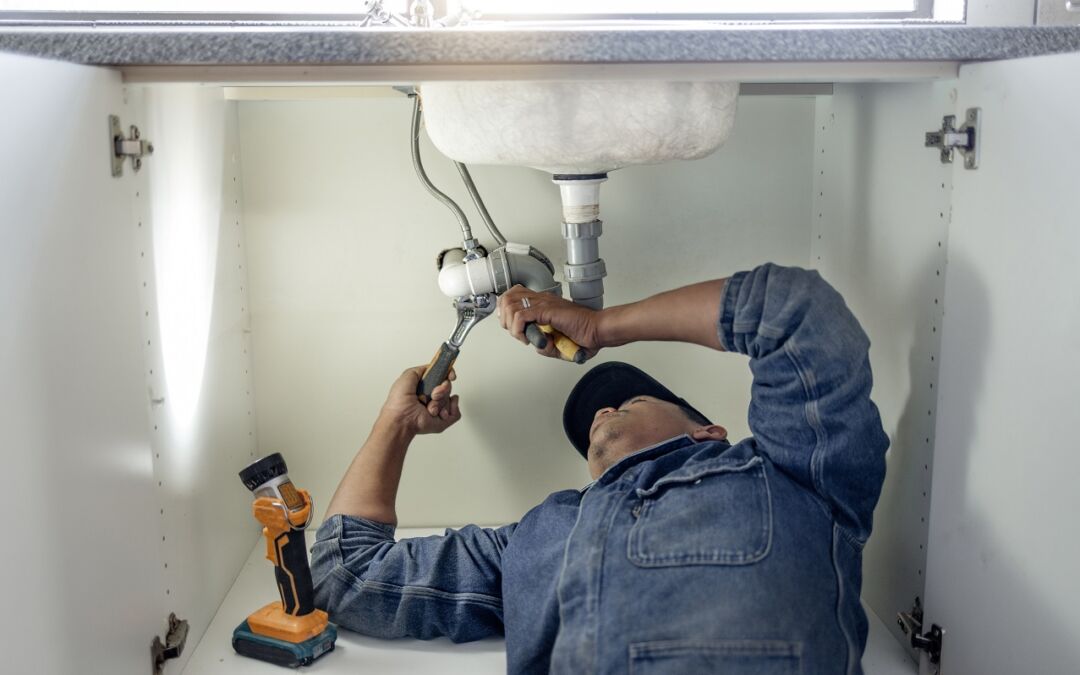
Jun 27, 2023 | Leaking Pipe, Plumbing services
Leaks from under the sink can be both unsightly and hazardous; mouldy puddles could form within your cabinet if left unresolved for too long. It is imperative that this issue is taken care of quickly before it escalates into a more serious concern, bringing with it damaged furniture and potential health complications of mould and mildew.
Your problem might be fixable by yourself with some troubleshooting tips; however, if your knowledge of plumbing tasks is limited, it would be wiser to seek professional assistance from a reputable emergency plumber.
1. Tighten the Slip/Compression Nuts
If you notice water pooling under your sink cabinet or seeping through to your floors, or worse yet, leaking all over them, now is the time to take action. A leaky drain can not only be inconvenient, but could lead to mould growth and structural damage that threatens health and well-being.
If the leak is due to loose slip nuts (compression nuts), tighten them using for optimal results, use a pipe wrench or adjustable pliers.
If the leaks are due to corrosion, you will need to replace them with new ones. Before making your replacements, apply Plumber’s Tape around all threaded areas in your drain to create a watertight seal and avoid over-tightening any nuts, as this could crack them and create leakage issues. If all else fails and there’s still leakage present after doing everything right, contact a professional same-day plumber near you who will be able to identify and address it efficiently.
Call Tap Tech at 343-305-1172 for all your emergency plumbing needs.
2. Check the Connections
If your slip-nuts remain loose and your pipes still leak, The Home Depot reports this could be due to compromised connections—possibly when pipe threads or fittings have worn down and no longer provide an effective seal.
To locate the source of leaking pipes, carefully examine the area underneath your sink. Look out for signs like puddles or moist and smelly floors, which indicate an ailing plumbing system, or check for loose drain covers or garbage disposal units that might also indicate problems.
If you notice water leaks, an easy way to pinpoint their location is by placing paper towels around them and checking them for wet spots. For longer-term solutions, it would be wiser to contact a professional plumber near you.
3. Apply Teflon Paste
On occasion, tightening slip nuts between drain pipes alone won’t suffice to stop leaks; when this occurs, Teflon Paste may provide the ideal solution.
Loosen the nuts to expose the washer and apply the paste around it then hand tighten the nut and make a guatrter turn with channel locks. If the leak still persists, consider calling in professional help, as they’ll likely provide more permanent solutions.
Same-Day Plumbing: 5-Star Service
Don’t keep yourself and your family in the lurch in the event of a plumbing disaster. Keep Tap Tech in your contact list so that you can have a professional plumber dispatched to your home with expert same-day service!
Call now at 343-305-1172 or book an appointment online.
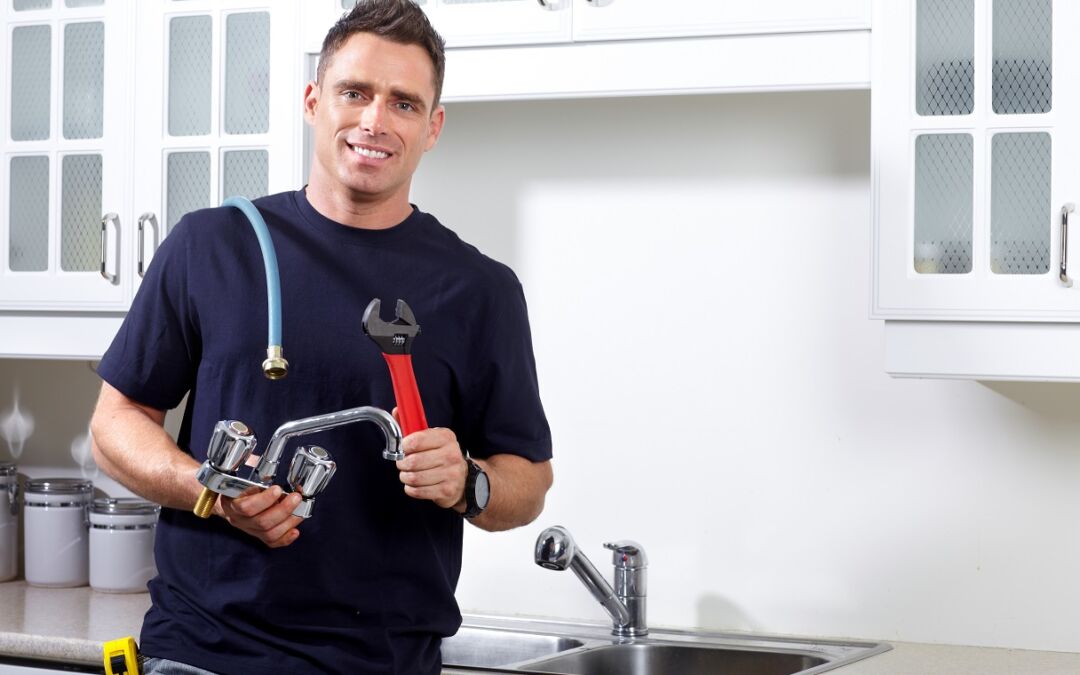
Jun 21, 2023 | Leaking Pipe, Plumbing services
Water leaks are frustrating, especially when they’re hard to find. Water leaks in your home can add up to thousands of dollars in wasted water and repairs. If you’ve noticed a leak or two after doing a quick inspection of your home, consider these potential causes when calling for an emergency plumber near you:
Shower Heads and Faucets
You may be surprised to learn that your faucets and shower heads can be the source of water leaks. If you have a leaky faucet, it’s usually easy to fix: just replace the washer inside. For a leaky shower head, try tightening the screws on the underside of it (or unscrewing them if they’re already loose).
If neither of those fixes work for you, then it might be time for some professional help from an experienced plumber—they’ll know exactly what’s going on with your plumbing system and how best to fix any issues before they become more costly problems down the road!
Leaky Toilet Flapper Valves
A leaking toilet flapper valve is the most common cause of household water leaks. The flapper valve is the rubber component that sits on top of your toilet tank and shuts off its water flow when you flush. If it doesn’t seal properly, it can cause a leak that wastes thousands of gallons of water each year.
To fix this problem:
Remove any excess debris from around or in between your flapper valve assembly; if there’s still an issue after doing so, try replacing it with another one (you may need to call a plumber near you for help).
Frozen Pipes
Deleted: The first step to preventing a frozen pipe is to make sure to leave your faucets running just a trickle. If you leave your home for an extended period shut off the main valve.That way, if one does freeze up and burst, it won’t cause damage throughout your home.
Conclusion
We hope that this article has helped you understand some of the most common causes of household water leaks.
If you’re still not sure what’s wrong with your plumbing or if you think there may be a leak somewhere in your home, we highly recommend calling a professional plumber who can help diagnose the problem and fix it quickly!
At Tap Tech, we provide first-class, same-day service—with no hidden fees, we always provide our rates up-front over the phone.
For 24/7 emergency plumbing with 5-star service near you in South Eastern Ontario, get in touch today: call +343-305-1172 or book online!
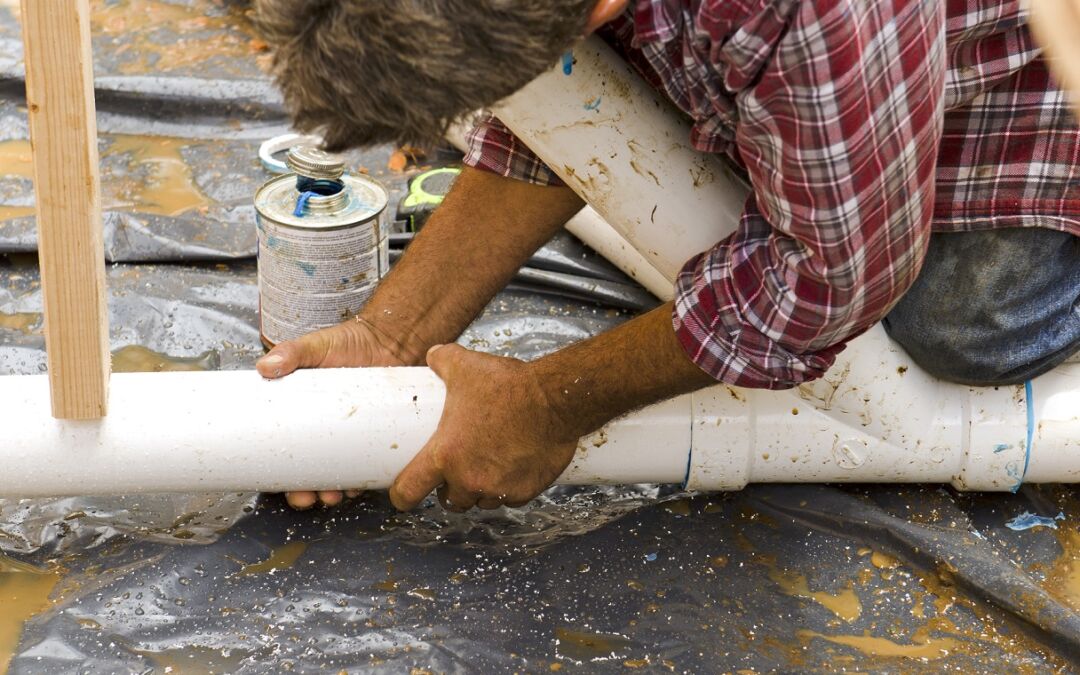
Jun 19, 2023 | Leaking Pipe, Plumbing services
Plumbing leaks are a major problem in homes. They can waste water, damage floors, walls and furniture, and cause mould growth. If you see water or moisture accumulating around your pipes or fixtures, it could be a sign of a leak. Look for any of these signs that you may have a hidden plumbing leak:
Keep Your Plumbing Pipes Clear
Maintaining a well-functioning plumbing system begins with keeping your pipes clear. Ensuring that they are obstruction-free is a vital step in preventing emergency plumbing concerns. If required, you can consider the use of a pipe snake, a tool that can effectively clear out any debris inside your pipes.
A water jetter may be an efficient tool to help with more stubborn blockages that may be the underlying cause of a leak. This device works by releasing a high-power jet of water to dislodge obstructions within your plumbing system. You may also opt for drain cleaners, specifically those made for sinks and tubs, to maintain the cleanliness and functionality of your pipes.
Check for Leaks Regularly
In addition to keeping your pipes clear, you should regularly check for leaks in your plumbing system. Incorporate a monthly inspection into your routine to catch any potential leaks before they escalate into a more severe concern. It is a good idea to check under your sink or in the basement, extending your inspection to the toilet tank and the pipes located behind the walls. This comprehensive approach ensures a more accurate assessment of your plumbing system’s condition.
Use Pipe Tape and Joint Compound to Stop Leaks
If you have a leak, there are two ways to fix it. The first is to use pipe tape and joint compound. Pipe tape is a durable material that can be wrapped around the threaded connections between pipes to create an airtight seal.
A joint compound is a flexible paste that you spread over any cracks or holes in your plumbing system in order to seal them up tightly, so no water can escape through them.
If you’re not a handy person or would rather trust a professional for on-demand emergency plumbing, call our experts at 343-305-1172 to quickly rectify the issue.
Replace Old Caulking and Pipes
If you’ve noticed that your home has many leaks, it may be time to replace your piping . The average lifespan for household plumbing is 15 – 25 years. If your home and plumbing system are older than that—or looks like it could use some TLC—it may be time for an upgrade to replace your plumbing and pipes.
Emergency Plumber Near You
Leaking pipes can be a major concern. If you’re unsure of what to do, get in touch with a reputable, experienced emergency plumber near you! At Tap Tech, we service the entire Southern Ontario region with premium, on-demand emergency plumbing service. We know what to look for and how to fix it; let our experts help with:
- Urgent Plumbing Services
- Flooding Repair
- Sewer Backup Repair
- Sump Pump Failure Repair Service
- Leak Repair
- water heater repair services
If you have any questions about how we can help with your plumbing concerns, or if you urgently require same-day emergency plumbing, get in touch today! Call 343-305-1172 or book online!







